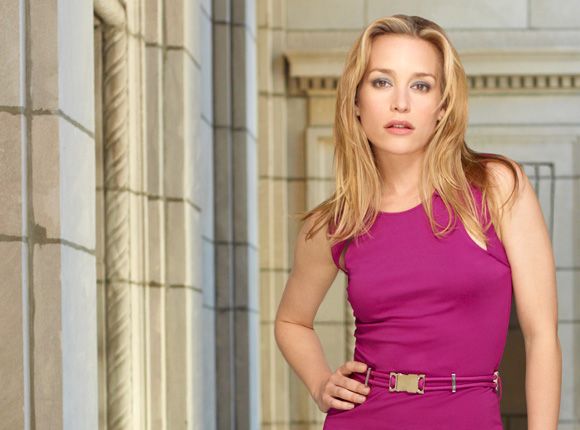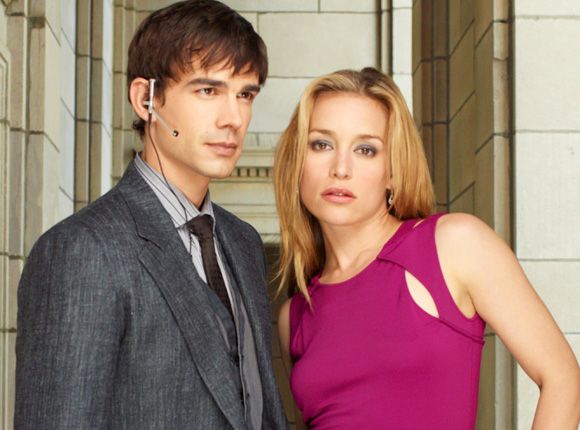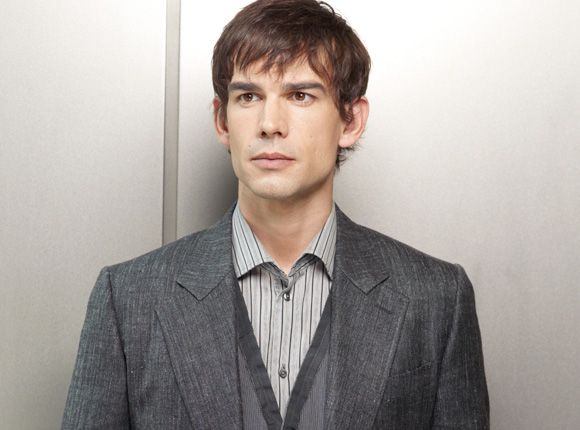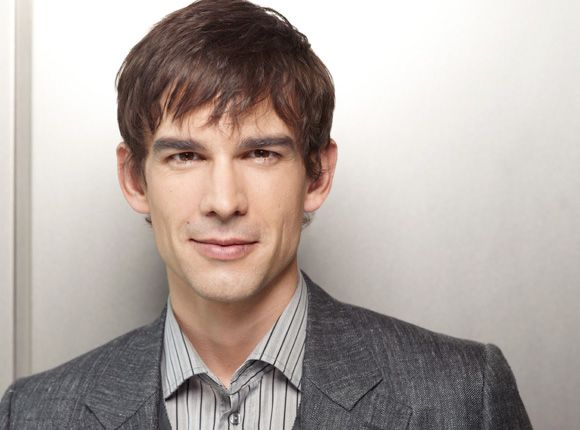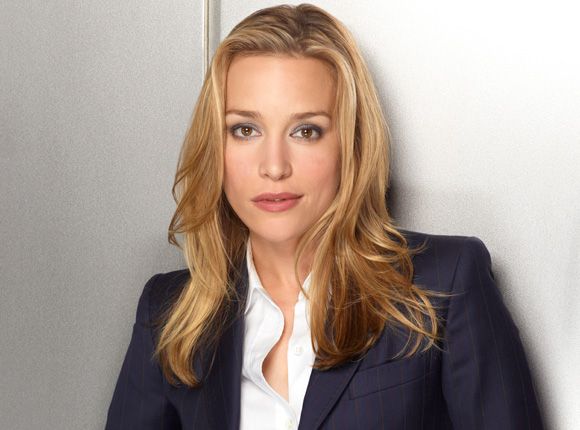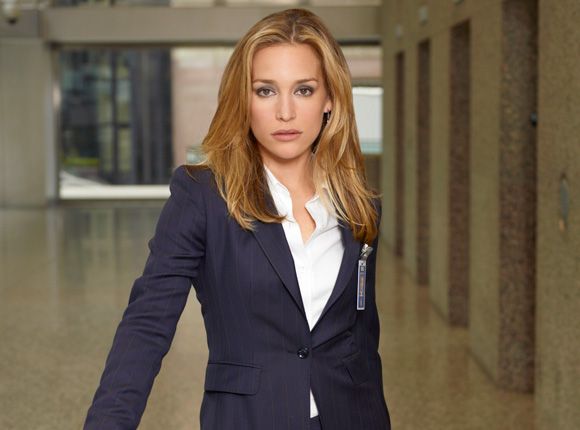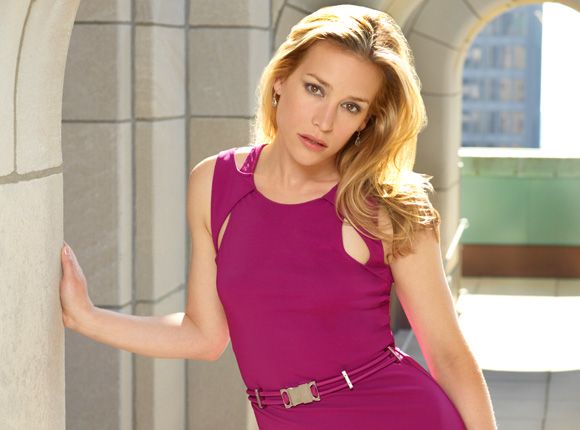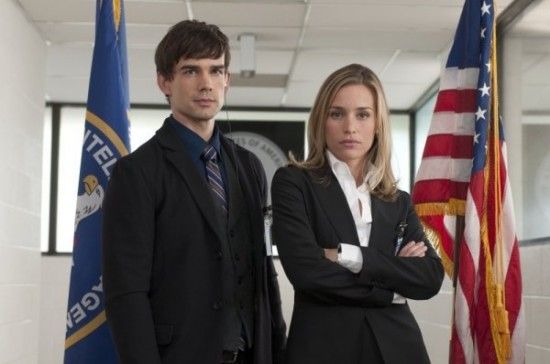On the new USA Network action thriller Covert Affairs, actress Piper Perabo is Annie Walker, a young woman new to the government’s most secretive branch, the CIA. With the instincts, tenacity and persistence to become a lethal weapon, Annie dedicates herself to her new job, but soon realizes it means having to lead a double life, whether it’s lying to her family or facing down ruthless terrorists around the world. Former CIA special operative, Auggie Anderson (Christopher Gorham), who went blind during a mission, quickly takes Annie under his wing to help her navigate the system, and she learns that he is the one guy she can trust.
During a recent phone interview, co-stars Piper Perabo and Christopher Gorham talked about working together, being part of the successful USA Network family and developing characters for television. Check out what they had to say after the jump:
Piper, since this is your first series, how did this come about? Were you looking for a series? Had you been asked to do one before?
Piper: I wasn’t looking for a series, actually. I was in the middle of doing a Broadway play when this came across my desk. I was thinking of what I was going to do when the play ended, and I was reading films, but I just wasn’t finding anything that I really connected to. And, when this came across my desk, not only did it have the pedigree of Doug Liman, but it was a character that I thought would be really fun to play, episode after episode, because it would evolve and change. And, I talked with the boys a lot about how Annie would evolve. I even like not knowing, specifically, where the story’s going. When you make a film, you know where you’re going for the whole arc of the story, from the beginning. But, in this arc, I can’t see the end yet. It makes for a whole different kind of work. I didn’t expect that, and I’m really enjoying that.
What do you both think about being on the USA Network?
Chris: I think the way that they run their network is really smart. It starts with development. They only develop a very small group of shows, and then they only shoot a couple pilots a year, which is why I think they’ve had such a high success rate. They only really get behind the stuff that they believe in. For me, I think it’s an incredible opportunity. I’m really excited. And, on top of that, the show’s turning out great. We have really high hopes.
Piper: I would agree with that. This is my first foray into a series, so I don’t have a lot to compare it to, but when I compare it with films that I’ve done, it feels of equal caliber. It seems like every episode that we do is a mini-movie, with the amount of stunts and cameras and shots that we’re trying to achieve, so I think it’s going to make for really exciting television.
Piper, when you were a young girl, did you ever pretend to be a secret agent?
Piper: I was a tomboy, growing up. But, the props are definitely better now and your mom isn’t there to stop you. I was a tomboy, jumping off the roof and stuff like that. Now, I have Chris [Gorham] and Doug [Liman], and we’re jumping off of buildings and down elevator shafts, and we’re crashing cars. They encourage us to break stuff, so I enjoy it even more.
That’s not actually you jumping out of that plane in the first episode, right?
Piper: I’m so mad because I already told somebody that it wasn’t me, and then I talked to the woman who jumped out of the plane and she was like, “You don’t have to say it was me.” But, it wasn’t me jumping out of the plane. I would have jumped out, but USA would never have let me do it.
Piper, is it true that the majority of people at the CIA are young because they’ve lifted the hiring freeze? Is there really a Starbucks, right inside the building?
Piper: Yeah, I went down to Langley, for the day. Valerie Plame Wilson was our Technical Advisor on the pilot, so we have connections down there. I spent the day down there and met agents who are the same age as Chris and I, and I talked with them about their lives and what’s going on, and a lot of the things that we’re drawing on from the show are based in the dirty details of reality.
In another world, do you think you would have really enjoyed working in a place like that?
Piper: One thing that I really liked about it was the reason that they’re there. One of the agents that I spoke to said, “I serve at the pleasure of the President, regardless of who the President is.” It’s bigger than even the momentary political agenda. They believe in the ideals of this country. That was an old-fashioned and forthright mission statement that I didn’t expect. It charmed me in a way that I didn’t anticipate, when I first got to the CIA.
Your character, Annie, has been to a lot of places and done a lot of stuff, and your background says that you were born in Dallas, went to high school in New Jersey, went to college in Ohio, moved to New York and have worked all over. Does that give you a background, when you play this character?
Piper: I think so. With my traveling, especially my work in the last 10 years, has really given me a lot of language background, which Annie has, and also an understanding of the cultures and customs of all the different places that Annie has to go. Travel and my work life definitely feeds into the show.
What are your biggest challenges in doing this show?
Chris: For me, the obvious thing is playing a blind character. Having that kind of a physical disability was a big challenge, and something that I was really excited about. I’ve been working closely with The Canadian National Institute for the Blind, starting during the pilot and then continuing while we’ve been doing the show. It’s just been such an adventure. I’m constantly apologizing to directors. What seems like a very simple little scene ends up becoming really complicated because I start to think about how I’m going to do this without being able to see any of the furniture or my coffee, or anything. So, 10 minutes into rehearsal, I’m constantly saying, “You know what? I’m sorry, I need another minute.” It’s a big challenge, but it’s also really exciting. It’s made the process of doing a show brand new again, for me. I’ve really loved it.
Piper: Chris has had some of his teachers from the Institute for the Blind come in to work with me because I’ve never had a close friend who’s blind. There’s a whole skill to walking with someone, when you’re sighted and they’re not. How to work that out has been fascinating angle on the show. More and more, as we get into the field, it’s going to get even more interesting.
Do you enjoy the fact that this show has a lot of humor to it and isn’t just a serious drama?
Chris: I’m very happy.
Piper: Yeah, I’m happy about that. Chris makes me laugh. Even if they wanted it to be dark, I would be giggling in the background, so it’s good that we’re allowed to be funny.
Chris, with the blind aspect of your character, how did you apply what you learned at the institute?
Chris: It’s a million little things, and I’m still learning. I’ve made a couple friends over there now – a couple who are sighted and a couple who are not sighted – and it’s just been invaluable with the little details and things that then I can take and apply in the show. There are very simple things, like how to walk with a cane and how to find your coffee on your desk. That’s in the training that they give you at the center when you lose your sight. But, the fun little details and things that we’ll work into the show are things like how other people behave around someone who can’t see. I’ve gone out to dinner a couple of times with a friend of mine who’s blind, and it just blows me away at how people just freeze up. Waiters not only stop talking to him, but they’ll stop talking to me because they don’t know what to do. It’s really interesting.
I also get details from another friend who’s helped me over there. He’ll send me emails like, “Oh, I just thought of this, but something that’s really frustrating is automatic toilets in the public restroom.” I said, “What do you mean?,” and he said, “Well, imagine feeling around a nasty public toilet, looking for the lever to flush the thing, and then standing up in frustration and having it flush by itself.” Those are the little details that we can put in.
We had the woman at the center, who has been a great help to me, come out to the set just to look through my office set and see what she thought because she actually helped with the design of the Canadian National Institute for the Blind’s building. So, we did rounded corners on my desk and kept it relatively clutter-free with everything in its place, so that I don’t lose things. I’m still going there. I was just there the other day with a blindfold, in the kitchen, learning how to pour hot liquids into a cup because we’re going to see Auggie’s apartment and I wanted to know my way around in there. I haven’t seen the whole thing, just living room, and it’s really cool. In fact, they used one of my ideas. I thought it’d be really neat, in his apartment, if they had a big piece of art that was in brail, like a really tactiled painting, and they took that and ran with it. There’s this big brail work of art on the wall that’s just white, and it looks great.
Was there discussion about whether your character would actually wear the dark glasses or not?
Chris: There was, yeah. It’s actually really interesting because that is a real stereotype of the blind guy, and one that I actually fell into because I showed up to the audition with sunglasses on. On my way into the room, I was told by the casting director, “Oh, no, they don’t want glasses.” And then, on the fly, I had to make up what the hell I was going to do to look blind. So, yeah, we talked a lot about it. As I’ve learned more, I’ve found that the glasses are really to make other people comfortable because, when you can’t see, the bright lights aren’t going to bother you when you’re totally blind. There are a lot of people who are partially blind, where bright lights really do bother them. But, for Auggie, it’s not really a problem. We just use them occasionally when we’re outside. We never use them inside.
What are three words that best describe each of your characters?
Piper: Brave, fashionable and heartbroken.
Chris: God, those are good. I would say, driven, fearless and hungry.
How important is the relationship between your characters going to be to the show?
Piper: The instinct that I get from Auggie and my relationship is that this sort of relationship, that you just start to see the beginning of in the pilot, really takes hold as the episodes continue. He’s my one person that I can confide in, and not worry about failing in front of. He becomes a really important component of me being able to succeed.
Chris: Yeah, Auggie really takes Annie under his wing, in the beginning, and they have a real connection. In the pilot, they have this superficial connection. She loves Mingus, and he’s obsessed with Mingus, so they like the same music. But then, as the show goes on, they quickly become fast friends. I think he feels protective of her and wants her to succeed. There’s a real connection, and it’s definitely a big part of the show. Auggie has slept with a lot of the women at the Agency, so when they first meet, he assumes that they’re going to hook up. But, for some reason, the relationship with Annie quickly moves past the casual hook-up and into a real friendship. What comes out of that friendship is potentially a long-term storyline.
Piper, were you surprised that the Agency encourages their employees to date other employees?
Piper: Yeah, I’m still surprised by that. But, the more you understand how secretive you have to be about everything and how compartmentalized your life becomes, I can understand why you would date someone in the Agency. They’re really the only people who understand the full extent of what you’re doing in your life.
How much do you know about Annie and her mystery man?
Piper: I think I know less than I knew when we started. As I’ve seen more of the Ben Mercer character, it’s gotten muddier about whose side he’s on. Somebody asked me, the other day, if we’re going to find out who he is by the end of this season, and I don’t even know that. It’s definitely getting more complicated than less, with him.
Chris, how do you like the name Auggie?
Chris: It’s grown on me. His full name is August, and I actually really like that. It would automatically get shortened to Auggie, and I’ve been able to just fill in the blanks, as far as how that happened and how much fun I think his buddies in the military would have with his very intimidating sounding name.
What does Auggie like about Annie?
Chris: What’s not to like about Annie? In order of how Auggie would notice them, she smells good, she’s smart, she has a great sense of humor, she gets him and she likes Mingus. After that, he was done. He was like, “All right, I like this girl.” In the first episode, she really proves herself that she belongs there, and that’s important to him. Auggie comes out of Special Forces, so he’s no joke, when it comes to the operations, and she passed every test.
Piper, it’s rare to see a spy show where the hero is learning on the job. Do you see the eventual progression of the show as Annie learning how to be a total kick-ass, “Alias” type of character?
Piper: I think Annie is definitely going to progress, in her talent and level as a spy. But, I also think, for officers who really do work in the field, your whole job, for the length of your career, is on the fly. There are so many things that come up that you could have never planned and trained for. These people are really, in a lot of ways, creative types because they have to solve problems that you could never imagine were going to come up.
Chris: Yeah, you don’t see the same kind of thing twice.
Piper: You can learn to pick locks and set explosives, but after that, you’re on your own. That’s what makes it interesting. I think what interests Doug Liman is that it has that “Nikita” quality to it. You see them in a situation and you see how they start so quickly adapting. It’s really dramatic.
Did you go to any kind of training camp to physically getting into shape for this role? Also, did you do any gun training and stuff like that?
Piper: Well, right now, my character doesn’t carry a gun. CIA officers don’t carry firearms when they’re on U.S. soil. I did go to Langley and spent the day there with agents who are my age, and they briefed me a lot on their lifestyle and their training. I didn’t go the farm where they do their physical training, but I did do a lot of physical training before the pilot, predominantly combat training for the hand-to-hand combat things that we do.
Chris: Trust me, she can fight.
What surprised you the most about the whole CIA lifestyle?
Piper: I had lunch with a bunch of different agents, and one of the guys told me that his wife doesn’t know that he works for the CIA, and I couldn’t believe that that really happens. That’s how secret it has to be. Every person that you tell, it puts them in danger. The CIA told me that you’re allowed to tell whoever you want, just with the realization that it’s going to put them in danger, the more that they know.
Would you tell a spouse, if you were in the CIA?
Piper: I don’t think I would. When he was telling me this about his wife, I really pressed him on it. I said, “You know, I’m sure your wife is smart. Do you think sometimes that she knows what you do and has chosen to leave it the way you’ve set it up?” And, he said, “Yeah, some days, I think she does know where I go to work.” It’s interesting. It’s a complex, dual life that they have to lead.
Chris: It’s an interesting question because the honest answer is that I don’t know. I guess it would depend. I think the first reaction I would have had, if I had been there, would be the same as Piper. I would have been incredulous because I know there are people whose spouses do know. I would definitely keep it from my kids. My wife, I guess it would depend. I don’t know. That’s a tough question.
Piper, Annie is such a complicated character. What do you hope she will have learned or maybe achieved by the end the first season?
Piper: This seems like a small thing, but Annie’s still learning basic protocol on how to take on an assignment. In some ways, that slows her down. Sendhil Ramamurthy has joined our show and, when I’m in the field with him or Chris Gorham, there’s a pace that we can pick up because these guys have been with the CIA longer and know how to handle situations just because of their experience level. So, I’m looking forward to Annie having a little more confidence, in having learned from these guys.
Chris, what’s been your favorite tech item to play with, so far?
Chris: I have this active brail keyboard that’s pretty cool.
Piper: That’s just nerdy, dude. You’re so nerdy it’s awesome.
Chris: It’s really cool. I also have a laser cane. It’s this thing that we have invented for Auggie. Tim Matheson directed the pilot and wanted something visually more high-tech than your standard white cane for Auggie, so we came up with this laser cane that actually isn’t that far ahead of current technology. Something similar to it could exist. That thing’s really great. It has this visible laser that creates this grid, so he can flash it around the room and get vibratory feedback on the stick that he’s holding. It also shoots out sonic waves. It’s has sonar on it, which is a real technology. One of the guys that I’ve been working with, through the center, has one of those sonic wands and let me try it out to listen to the sounds. The nice thing about that is, because lasers would go through glass, it wouldn’t bounce back. On top of that, it gives you an idea of what it is that you’re looking at because every physical object resonates at a different level. It actually sounds different, if I’m pointing it at wood, or I’m pointing it at tile, carpet, a glass wall, a brick wall or a person. It’s really neat. Instead of just a white cane, which only gives me information at my feet, only two or three feet in front of me, I can use that to flash around an entire room and get an idea of the dimensions and what’s in that space. It comes in really handy.
Can you talk about some of the guest stars you’ll have this season?
Piper: We’ve had some amazing people. Oded Fehr was one of our guest-stars, and he plays an Israeli spy from the Mossad. His action film background made him unparalleled, as someone to work with and come in as a guest-star. And, Eriq La Salle was one in a recent episode. And then, we just finished an episode with Anna Camp.
Chris: And, Greg Itzin came in. He’s recurring, and he couldn’t be more valuable to the show. He’s just amazing, and we all love him dearly.
Piper: I think of him as part of our regular cast because we have him so much.
Chris: The caliber of people that they’re bringing in to play these guest parts is really exciting. We’ve also got somebody coming in to play a very important person from Auggie’s past, but we can’t tell you yet. But, it’s cool. She’s great.
Chris, how much is Auggie going to be out in the field?
Chris: Him getting out in the field is an irregular thing, but he does get out. In fact, we’re just about to start an episode where he’s really out in the field, actually on assignment. There’s an episode where he’s out in the field, but really shouldn’t be. He just can’t help himself sometimes. So, yeah, he does get out of the office. They’ve been really good about making sure that that happens, and being really creative about it. He does have limitations. He’s very capable and great at what he does, but not being able to see does limit some things that he can do.
You’ve both had really varied careers, in different mediums. Are the two of you satisfied with where you are at right now, in your careers?
Piper: I’m actually really satisfied with where I am. This kind of show, and the challenge that it presents, both because of the quality of the writing and the ambition of the shooting style, is really fun, and it’s a really hard thing to find. So, I’m really, really happy with where I am.
Chris: Yeah, ditto for me. I couldn’t be happier. We have great writers who are doing a fantastic job, writing not only great stories, but really interesting characters. The network is behind the show, 100%, and everybody that works on it is really great. They’re not only talented, but just really nice people, which doesn’t always happen. So, I’m just really happy.


